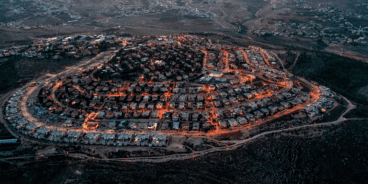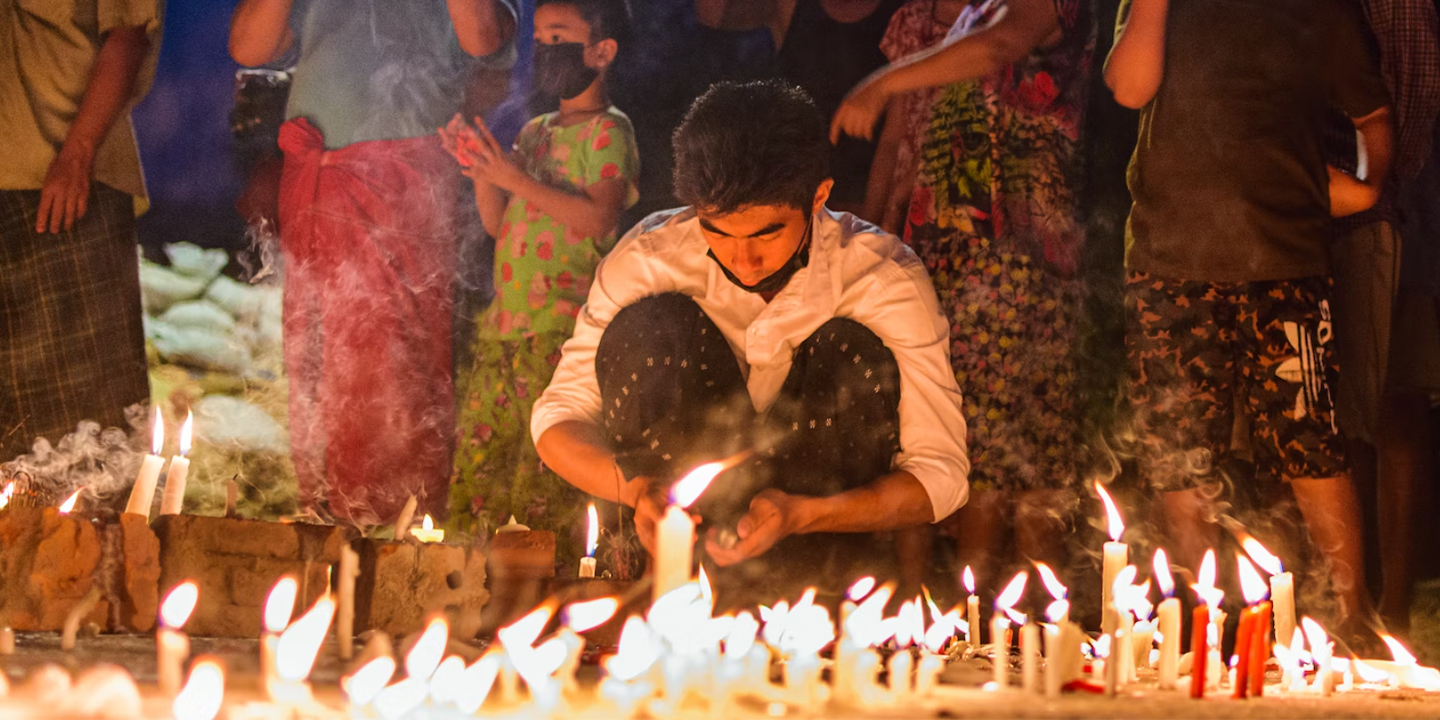

Atrocity Alert No. 312: Myanmar (Burma), Israel and the Occupied Palestinian Territory and DR Congo
Atrocity Alert is a weekly publication by the Global Centre for the Responsibility to Protect highlighting situations where populations are at risk of, or are enduring, mass atrocity crimes.
NEW REPORTS REVEAL EVIDENCE OF ATROCITIES IN MYANMAR
Crimes against humanity continue to be systematically committed in Myanmar (Burma), according to a report released by the UN’s International Investigative Mechanism for Myanmar (IIMM) on 9 August. Violent conflict -which has engulfed Myanmar since the military launched a coup in February 2021 – is disproportionately affecting women and children. The IIMM documented evidence of sexual and gender-based crimes, including rape and other forms of sexual violence, as well as crimes against children perpetrated by members of the security forces and armed groups. Children in Myanmar have also been tortured, conscripted and arbitrarily detained, including as proxies for their parents.
“Crimes against women and children are amongst the gravest international crimes, but they are also historically underreported and under-investigated,” Nicholas Koumjian, Head of the IIMM, said in a press release. “Perpetrators of these crimes need to know that they cannot continue to act with impunity. We are collecting and preserving the evidence so that they will one day be held to account.”
The IIMM’s report was released two weeks before the five-year anniversary of the so-called “clearance operations” by the military against the Rohingya, a distinct Muslim ethnic minority, in Rakhine State. The operations were characterized by brutal violence and grave human rights violations on a mass scale. As a result, over 700,000 Rohingya were forced to flee to Bangladesh. Severe violations of universal human rights and the risk of atrocity crimes persists for the Rohingya population remaining in Myanmar as the military continues to perpetrate widespread and systematic human rights violations and abuses against civilians, particularly those from ethnic minority populations.
On 4 August Reuters released an investigative report based on a cache of thousands of official documents that provides significant insight into how Myanmar’s military planned the Rohingya genocide. The documents, collected by the Commission for International Justice and Accountability, reveal discussions and planning by senior military officials weeks before the “clearance operations” began, as well as their efforts to hide the operations from the international community.
Liam Scott, Myanmar Expert at the Global Centre for the Responsibility to Protect, said, “these reports clearly show that the previous government of Myanmar and the military systematically targeted populations within their borders, and that the military junta continues to do so. Based on the growing evidence of past and ongoing atrocity crimes, the UN Security Council should urgently refer the situation to the International Criminal Court and impose a comprehensive arms embargo on Myanmar. Moreover, additional states should formally intervene in The Gambia v. Myanmar Rohingya genocide case at the International Court of Justice.”
INDISCRIMINATE ISRAELI AIRSTRIKES ON GAZA CAUSE SCORES OF CIVILIAN CASUALTIES
At least 46 Palestinians, including 16 children, have been killed and over 360 wounded after three days of indiscriminate Israeli airstrikes on Gaza from 5-7 August. According to Palestinian officials, almost half of the Palestinians killed were civilians. Israeli forces launched this series of airstrikes throughout the Gaza Strip, including Gaza city, Beit Hanoun and Khan Younis, as part of an operation that it characterized as a “preemptive” act of self-defense. The airstrikes also destroyed residential buildings. In retaliation, rockets were fired from several locations in Gaza towards Israel, injuring dozens of civilians and damaging some civilian structures. The UN Special Rapporteur on the situation of human rights in the Occupied Palestinian Territory, Francesca Albanese, said the airstrikes on the Gaza Strip “not only are illegal but irresponsible.”
Prior to this escalation, tensions were high after as Israeli forces arrested a senior operative of the Palestinian Islamic Jihad (PIJ) armed group in Jenin in the occupied West Bank on 2 August. Following the arrest, the PIJ leadership issued a statement, claiming it would “respond to any aggression.” That same day, Israeli authorities imposed a closure of its crossings with Gaza, prohibiting people and essential commodities – including food and fuel – from entering or leaving. On 7 August the Israeli government and the PIJ reached a truce, brokered by Egypt. Tor Wennesland, Special Coordinator for the Middle East Peace Process, described the ceasefire as “fragile,” stressing that, “any resumption of hostilities will only have devastating consequences.”
The deadly airstrikes between 5-7 August marked the worst outbreak of fighting since May 2021, when Israeli airstrikes killed and injured over 2,170 Palestinians in Gaza and rocket fire by Hamas killed at least 12 Israelis. Indiscriminate attacks have frequently occurred throughout Israel’s air, sea and land blockade of the Gaza Strip, that for the past 15 years has inflicted collective punishment on the more than 2 million Palestinians trapped there. Escalations in fighting have exacerbated the already dire humanitarian crisis in Gaza where there are frequent shortages of potable water, food, medicine and other essential goods due to Israeli restrictions. As a result of Israel’s closure of the crossings into Gaza, on 6 August the Gaza Power Plant shut down for two days, causing drastic cuts to electricity supplies.
Israel’s continued occupation of Palestinian territory, as well as crimes against humanity, including apartheid and the persecution of Palestinians, has led to recurrent conflict and violations. Israeli authorities must cease its collective punishment of Palestinians and lift its blockade of the Gaza Strip. All violations of International Humanitarian Law should be investigated and perpetrators held accountable.
ARMED GROUPS TERRORIZING COMMUNITIES IN EASTERN DR CONGO
From 5-6 August alleged fighters from the Allied Democratic Forces (ADF) armed group killed at least 15 civilians during two separate attacks in the Democratic Republic of the Congo’s (DRC) eastern Ituri province. The military governor of Ituri said that the ADF targeted Kandoyi and Bandiboli villages in Irumu territory, where houses were also burned down during the deadly raids. The ADF has perpetrated recurrent atrocities and retaliatory attacks against civilians in Irumu and Mambasa territories of Ituri, as well as in villages surrounding Beni, North Kivu province, killing at least 1,500 civilians since January 2021.
The latest ADF attacks come as the security situation in eastern DRC has deteriorated. According to the UN Refugee Agency, “strings of coordinated attacks by multiple militia groups are terrorizing communities on a daily basis in the eastern provinces.” The volume of attacks is straining the capacity of the government’s armed forces (FARDC) and the UN peacekeeping operation in the DRC (MONUSCO) to provide adequate protection to populations. In particular, the redeployment of the FARDC to fight against the March 23 Movement (M23) armed group has created power vacuums and a fragile security environment, leaving civilians more vulnerable to attacks by groups like the ADF.
Populations in Rutshuru and Nyiragongo territories, North Kivu, are also at heightened risk of atrocities as a result of the intense clashes between the FARDC and M23. Parties to the conflict have used explosive weapons, such as mortar fire and artillery shelling, leaving civilians and civilian infrastructure at increased risk. According to a report by the UN Security Council mandated Panel of Experts, as of July the M23 controlled a territory nearly three times as large as it did in March. Human Rights Watch has documented abuses in areas under their control, including attacks on villages and summary killings of civilians.
Amidst the rising violence, the resurgence of M23 has not only resulted in further displacement and atrocities, but also heightened tensions between the government and local populations, as well as with MONUSCO. After dozens of deaths during anti-UN protests in late July, the Congolese government plans to reexamine the withdrawal of MONUSCO. M23’s renewed offensive has also exacerbated regional tensions, particularly between the governments of DRC and Rwanda. On 4 August several media outlets reported that the UN Group of Experts found “solid evidence” of Rwandan troops fighting alongside and providing other support to the M23.
The DRC government and neighboring states should pursue regional diplomacy and dialogue to ease tensions and break the cycle of violence. The international community should suspend military assistance to governments found to be supporting the M23 and other abusive armed groups. The DRC government and MONUSCO must rebuild trust and strengthen their partnership to ensure the mission can effectively carry out its mandate. All armed groups must cease their senseless attacks on civilian populations.
Related Content


Atrocity Alert No. 403: Israel and the Occupied Palestinian Territory, Sudan and the UN Human Rights Council
